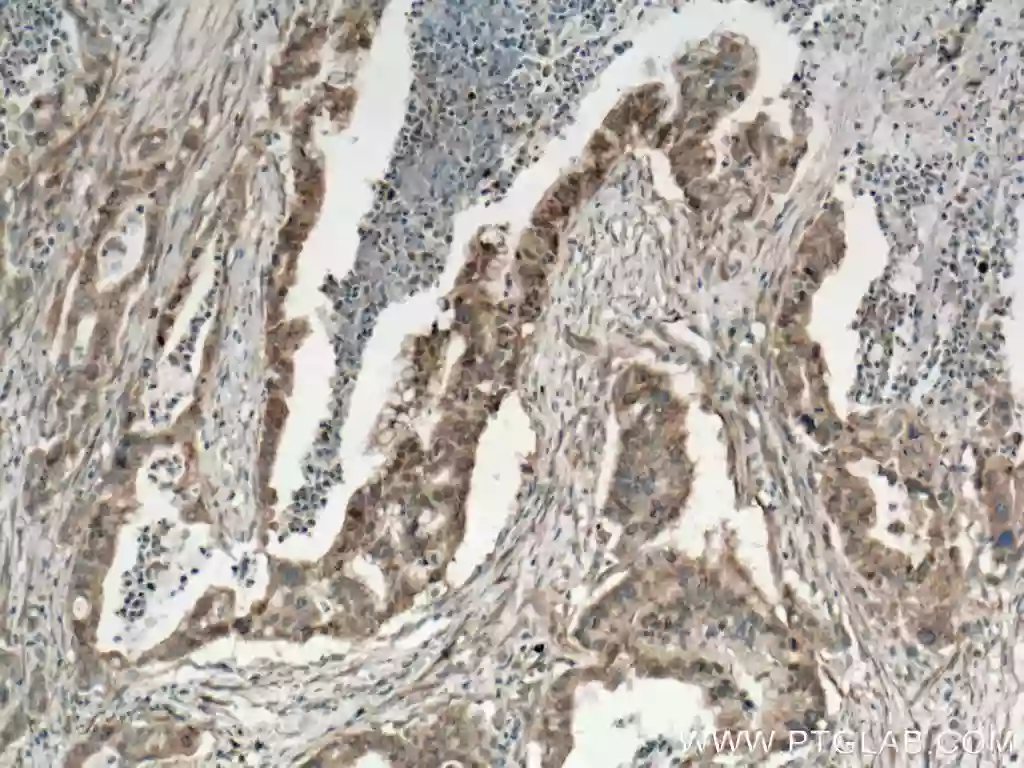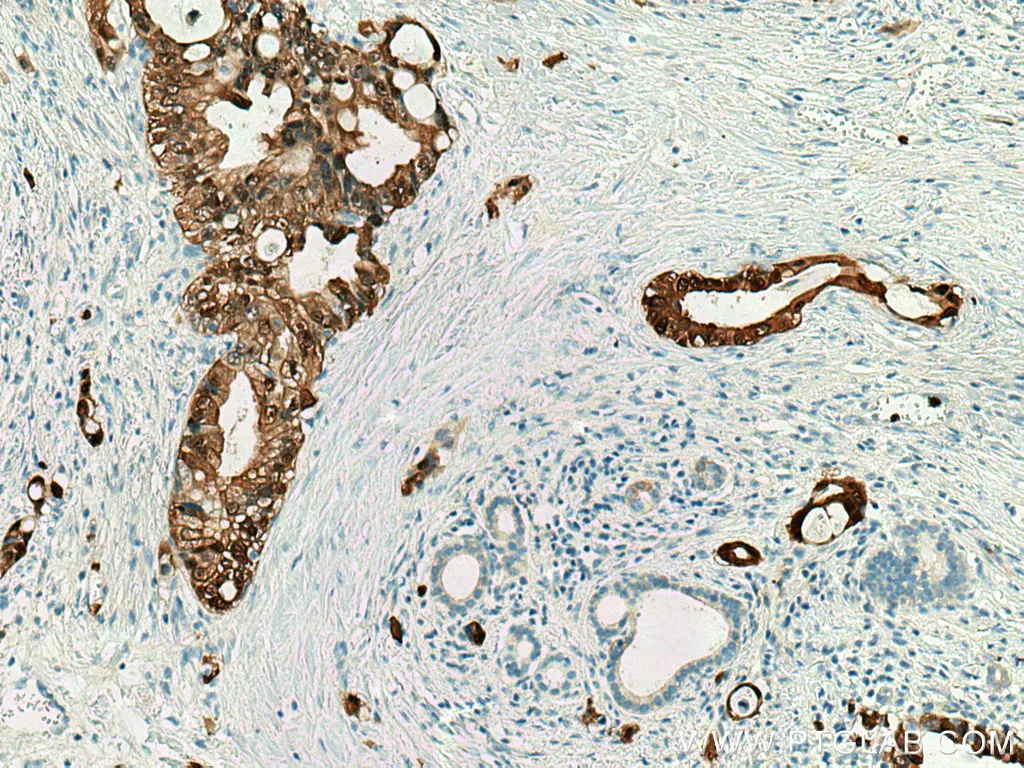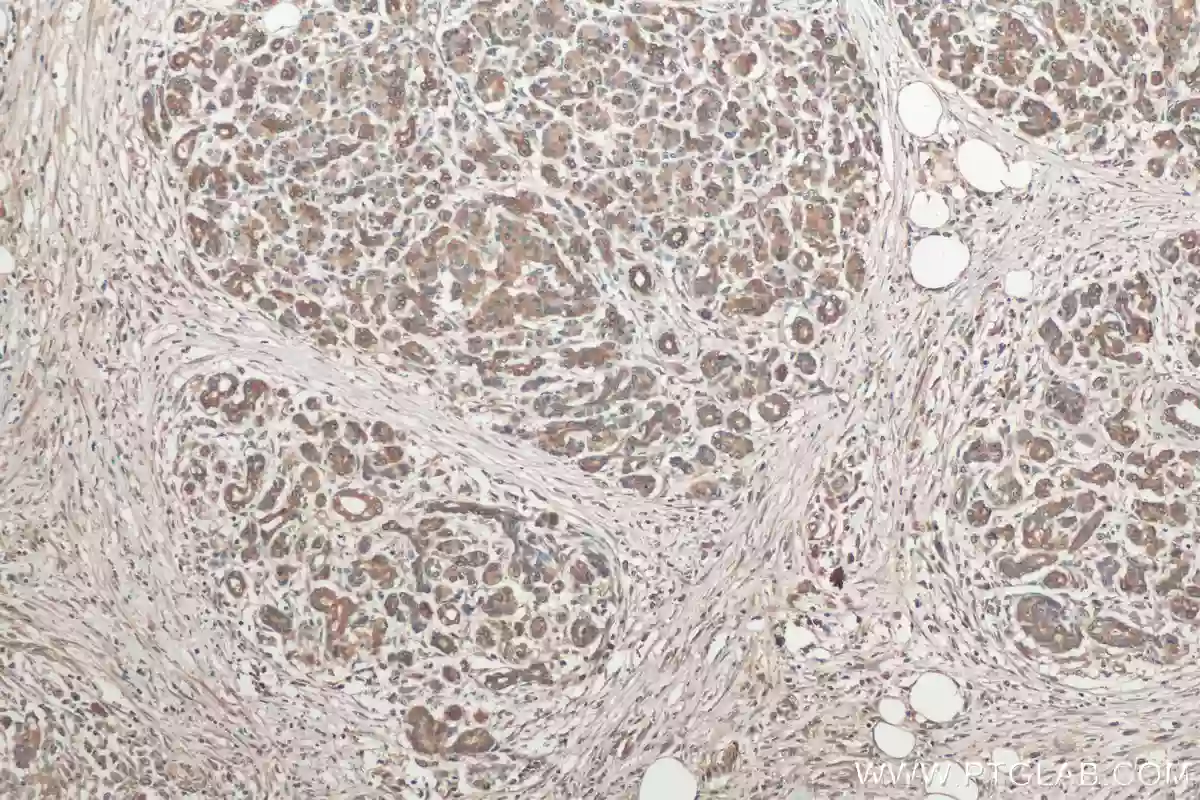Pancreatic Cancer
Solve the pancreatic cancer puzzle with the assistance of our library of antibodies, ELISAs, and IHC Kits
Introduction
Pancreatic cancer is one of the most devastating cancers worldwide, with a five-year survival rate of only 11.2%. This is largely because over half of pancreatic cancer diagnoses occur after the primary tumor has already metastasized to other sites across the body. An earlier diagnosis could allow for more efficient treatments and better chances of survival. However, the screening methods for pancreatic cancer are not as well established as other malignancies such breast, prostate, and colorectal cancer. Increased detection and monitoring of cancer-specific biomarkers may allow clinicians and researchers to better understand the puzzling origins of this disease. Proteintech’s pancreatic cancer portfolio consists of several IHC-compatible antibodies, many already validated in pancreatic cancer tissue, and a selection of ELISA kits against emerging serological biomarkers.
Featured Biomarkers
KRAS
KRAS is a member of the Ras family of GTPase proteins that also includes HRAS and NRAS. These proteins are important mediators of signal transduction and often activate several downstream pathways that regulate cell proliferation, growth, survival, and motility. The KRAS gene is commonly mutated in nearly 90% of pancreatic cancer cases and it has been shown that this mutation often drives the progression of pancreatic cancer and further accumulation of mutations in other oncogenes. Mutated KRAS proteins are often constitutively active, resulting in the dysregulated growth and transformation pathways that promote pancreatic cancer growth, survival, and metastasis. Proteintech’s KRAS antibody is a favorite among researchers worldwide, cited in nearly 100 publications.

Immunohistochemical analysis of paraffin-embedded human pancreatic cancer tissue slide using 12063-1-AP (KRAS antibody) at dilution of 1:800 (under 10x lens).
S100P
S100P is a member of the S100 family of calcium-binding proteins. It was initially discovered in placenta but also has rather high specificity for pancreatic cancer tissue; S100P levels are significantly elevated in cancerous tissue and continue to increase with successive stages of disease progression. In addition to serving as a biomarker for disease monitoring, S100P plays several roles in promoting tumor growth. It can protect pancreatic cancer cells from apoptosis and activates the RAGE protein, which promotes cancer invasiveness. Early studies are being conducted to determine whether inhibition of S100P activity with monoclonal antibodies can in turn slow pancreatic cancer progression and improve patient prognosis.

Immunohistochemical analysis of paraffin-embedded human pancreatic cancer tissue slide using 11803-1-AP (S100P antibody) at dilution of 1:8000 (under 10x lens).
PERK
PERK is a protein kinase that phosphorylates the EIF2a translation factor in response to cellular stress. This results in an inhibition of translation activity which allows cells to adapt to changing extracellular conditions because they can now conserve energy typically spent on protein synthesis. This phosphorylation activity is particularly useful in allowing tumor cells to survive. Both PERK and phosphorylated-EIF2a are often overexpressed in pancreatic cancer tissue. This has been correlated with lower long-term survival as well as a higher risk for disease metastasis and recurrence after surgical removal of the primary tumor. As such, inhibiting PERK activity may prove to be a useful method to reduce the ability of pancreatic cancer cells to survive in unfavorable microenvironments.

Immunohistochemical analysis of paraffin-embedded human pancreatic cancer tissue slide using 20582-1-AP (PERK/EIF2AK3 antibody) at dilution of 1:200 (under 10x lens).
Antibodies for Pancreatic Cancer Research
|
Function |
Marker |
PTG Catalog |
|
Cell Growth and Survival |
22362-1-AP |
|
|
14533-1-AP |
||
|
21112-1-AP |
||
|
18986-1-AP |
||
|
11204-1-AP |
||
|
22474-1-AP |
||
|
17938-1-AP |
||
|
12063-1-AP |
||
|
19899-1-AP |
||
|
20582-1-AP |
||
|
12268-1-AP |
||
|
15047-1-AP |
||
|
20705-1-AP |
||
|
Cancer Type Differentiation |
16195-1-AP |
|
|
24756-1-AP |
||
|
15850-1-AP |
||
|
11803-1-AP |
||
|
Metastasis |
11858-1-AP |
|
|
15283-1-AP |
||
|
12750-1-AP |
||
|
66404-1-Ig |
||
|
28703-1-AP |
||
|
20233-1-AP |
IHC Kits for Pancreatic Cancer Research
|
Function |
Marker |
PTG Catalog |
|
Cell Growth and Survival |
KHC0612 |
|
|
KHC0656 |
||
|
KHC0140 |
||
|
KHC0130 |
||
|
Cancer Type Differentiation |
KHC0192 |
|
|
Metastasis |
KHC0603 |
|
|
KHC0123 |
ELISA Kits for Serum Biomarkers
|
PTG Catalog |
Marker |
Range |
Sensitivity |
|
KE00157 |
0.47-30 ng/mL |
0.03 ng/mL |
|
|
KE00156 |
78.1-5000 pg/mL |
29.4 pg/mL |
|
|
KE00256 |
15.6-1000 pg/mL |
3.4 pg/mL |
|
|
KE00251 |
31.25-2000 pg/mL |
4.2 pg/mL |
|
|
KE00281 |
31.25-2000 pg/mL |
4.6 pg/mL |
|
|
KE10033 |
31.25-2000 pg/mL |
3.8 pg/mL |
|
|
KE00126 |
0.625-40 ng/mL |
0.16 ng/mL |
|
|
KE00219 |
62.5-4000 pg/mL |
3.0 pg/mL |
|
|
KE00233 |
31.25-2000 pg/mL |
1.85 pg/mL |
|
|
KE00249 |
0.137-100 ng/mL |
0.002 ng/mL |
References
Cancer of the Pancreas - Cancer Stat Facts. (n.d.). SEER. https://seer.cancer.gov/statfacts/html/pancreas.html
He, Z., Zhou, Q., Guo, F., Chen, M., Tao, X., & Dong, D. (2021). S100 Proteins in Pancreatic Cancer: Current Knowledge and Future Perspectives. Frontiers in Oncology, 11. https://doi.org/10.3389/fonc.2021.711180
Luo, J. (2021). KRAS mutation in pancreatic cancer. Seminars in Oncology, 48(1), 10–18. https://doi.org/10.1053/j.seminoncol.2021.02.003
O’Neill, R. V., & Stoita, A. (2021). Biomarkers in the diagnosis of pancreatic cancer: Are we closer to finding the golden ticket? World Journal of Gastroenterology, 27(26), 4045–4087. https://doi.org/10.3748/wjg.v27.i26.4045
Wang, E. W., Akasaka, H., Zhao, J., Varadhachary, G. R., Lee, J. E., Maitra, A., Fleming, J. B., Hung, M. C., Wang, H., & Katz, M. H. (2019). Expression and Clinical Significance of Protein Kinase RNA–Like Endoplasmic Reticulum Kinase and Phosphorylated Eukaryotic Initiation Factor 2α in Pancreatic Ductal Adenocarcinoma. Pancreas, 48(3), 323–328. https://doi.org/10.1097/mpa.0000000000001248
Related Content
Cancer stem cells as a key to cure cancer
Molecular markers for liver cancer

Support
Newsletter Signup
Stay up-to-date with our latest news and events. New to Proteintech? Get 10% off your first order when you sign up.
